Analyzing UK Social Policies: Austerity and Welfare Retrenchment
VerifiedAdded on 2022/11/29
|5
|1404
|429
Essay
AI Summary
This essay provides an analysis of social policies in the United Kingdom, exploring the impact of austerity and welfare retrenchment. It examines various policies related to education, healthcare (National Health Service), and family welfare, highlighting their benefits and effects on communities and groups. The essay discusses the role of government, the influence of ideology (particularly socialism), and contemporary issues faced by policymakers, welfare recipients, and stakeholders. It also references relevant academic sources to support its arguments. The essay concludes by emphasizing the benefits of social policies and the challenges they face in meeting the needs and expectations of society.
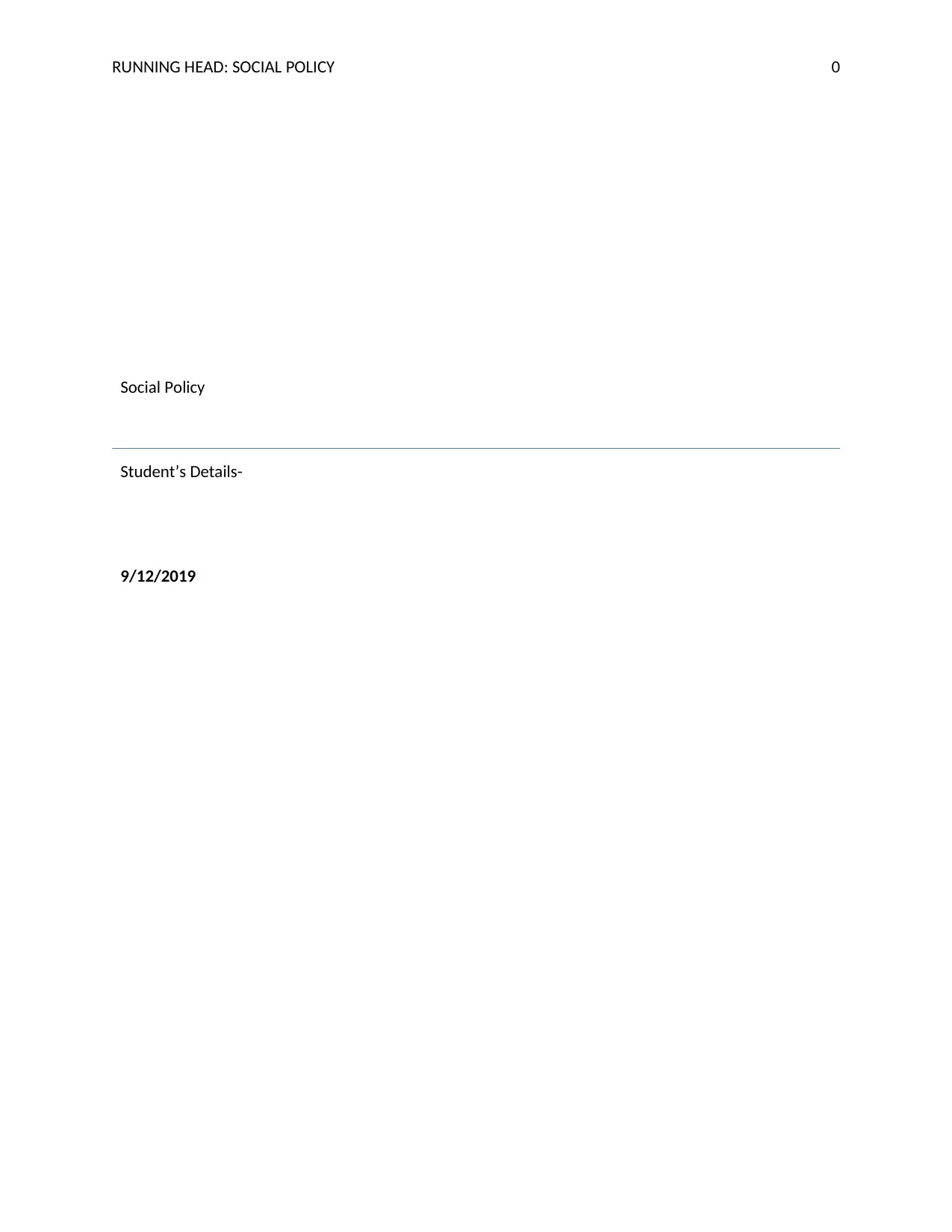
RUNNING HEAD: SOCIAL POLICY 0
Social Policy
Student’s Details-
9/12/2019
Social Policy
Student’s Details-
9/12/2019
Paraphrase This Document
Need a fresh take? Get an instant paraphrase of this document with our AI Paraphraser
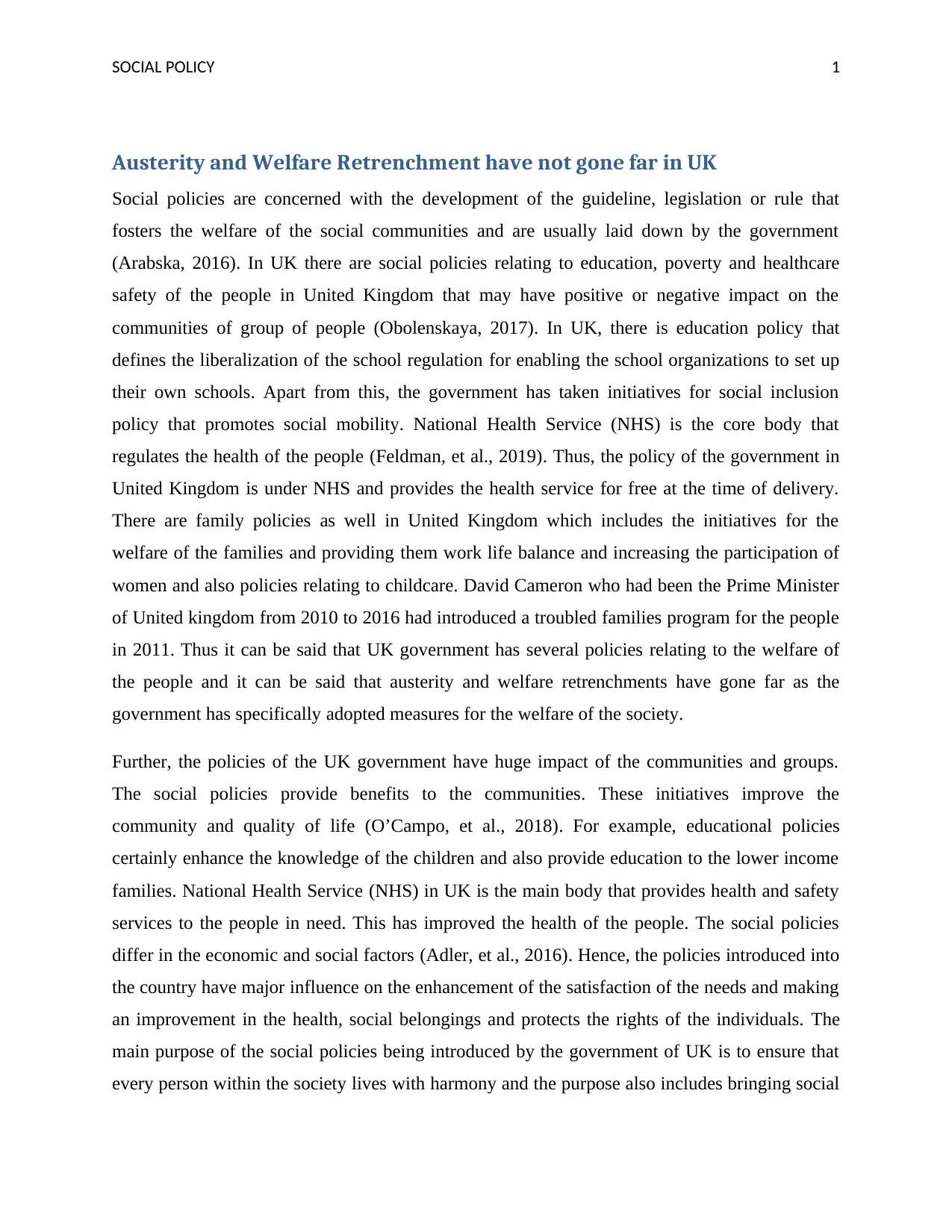
SOCIAL POLICY 1
Austerity and Welfare Retrenchment have not gone far in UK
Social policies are concerned with the development of the guideline, legislation or rule that
fosters the welfare of the social communities and are usually laid down by the government
(Arabska, 2016). In UK there are social policies relating to education, poverty and healthcare
safety of the people in United Kingdom that may have positive or negative impact on the
communities of group of people (Obolenskaya, 2017). In UK, there is education policy that
defines the liberalization of the school regulation for enabling the school organizations to set up
their own schools. Apart from this, the government has taken initiatives for social inclusion
policy that promotes social mobility. National Health Service (NHS) is the core body that
regulates the health of the people (Feldman, et al., 2019). Thus, the policy of the government in
United Kingdom is under NHS and provides the health service for free at the time of delivery.
There are family policies as well in United Kingdom which includes the initiatives for the
welfare of the families and providing them work life balance and increasing the participation of
women and also policies relating to childcare. David Cameron who had been the Prime Minister
of United kingdom from 2010 to 2016 had introduced a troubled families program for the people
in 2011. Thus it can be said that UK government has several policies relating to the welfare of
the people and it can be said that austerity and welfare retrenchments have gone far as the
government has specifically adopted measures for the welfare of the society.
Further, the policies of the UK government have huge impact of the communities and groups.
The social policies provide benefits to the communities. These initiatives improve the
community and quality of life (O’Campo, et al., 2018). For example, educational policies
certainly enhance the knowledge of the children and also provide education to the lower income
families. National Health Service (NHS) in UK is the main body that provides health and safety
services to the people in need. This has improved the health of the people. The social policies
differ in the economic and social factors (Adler, et al., 2016). Hence, the policies introduced into
the country have major influence on the enhancement of the satisfaction of the needs and making
an improvement in the health, social belongings and protects the rights of the individuals. The
main purpose of the social policies being introduced by the government of UK is to ensure that
every person within the society lives with harmony and the purpose also includes bringing social
Austerity and Welfare Retrenchment have not gone far in UK
Social policies are concerned with the development of the guideline, legislation or rule that
fosters the welfare of the social communities and are usually laid down by the government
(Arabska, 2016). In UK there are social policies relating to education, poverty and healthcare
safety of the people in United Kingdom that may have positive or negative impact on the
communities of group of people (Obolenskaya, 2017). In UK, there is education policy that
defines the liberalization of the school regulation for enabling the school organizations to set up
their own schools. Apart from this, the government has taken initiatives for social inclusion
policy that promotes social mobility. National Health Service (NHS) is the core body that
regulates the health of the people (Feldman, et al., 2019). Thus, the policy of the government in
United Kingdom is under NHS and provides the health service for free at the time of delivery.
There are family policies as well in United Kingdom which includes the initiatives for the
welfare of the families and providing them work life balance and increasing the participation of
women and also policies relating to childcare. David Cameron who had been the Prime Minister
of United kingdom from 2010 to 2016 had introduced a troubled families program for the people
in 2011. Thus it can be said that UK government has several policies relating to the welfare of
the people and it can be said that austerity and welfare retrenchments have gone far as the
government has specifically adopted measures for the welfare of the society.
Further, the policies of the UK government have huge impact of the communities and groups.
The social policies provide benefits to the communities. These initiatives improve the
community and quality of life (O’Campo, et al., 2018). For example, educational policies
certainly enhance the knowledge of the children and also provide education to the lower income
families. National Health Service (NHS) in UK is the main body that provides health and safety
services to the people in need. This has improved the health of the people. The social policies
differ in the economic and social factors (Adler, et al., 2016). Hence, the policies introduced into
the country have major influence on the enhancement of the satisfaction of the needs and making
an improvement in the health, social belongings and protects the rights of the individuals. The
main purpose of the social policies being introduced by the government of UK is to ensure that
every person within the society lives with harmony and the purpose also includes bringing social
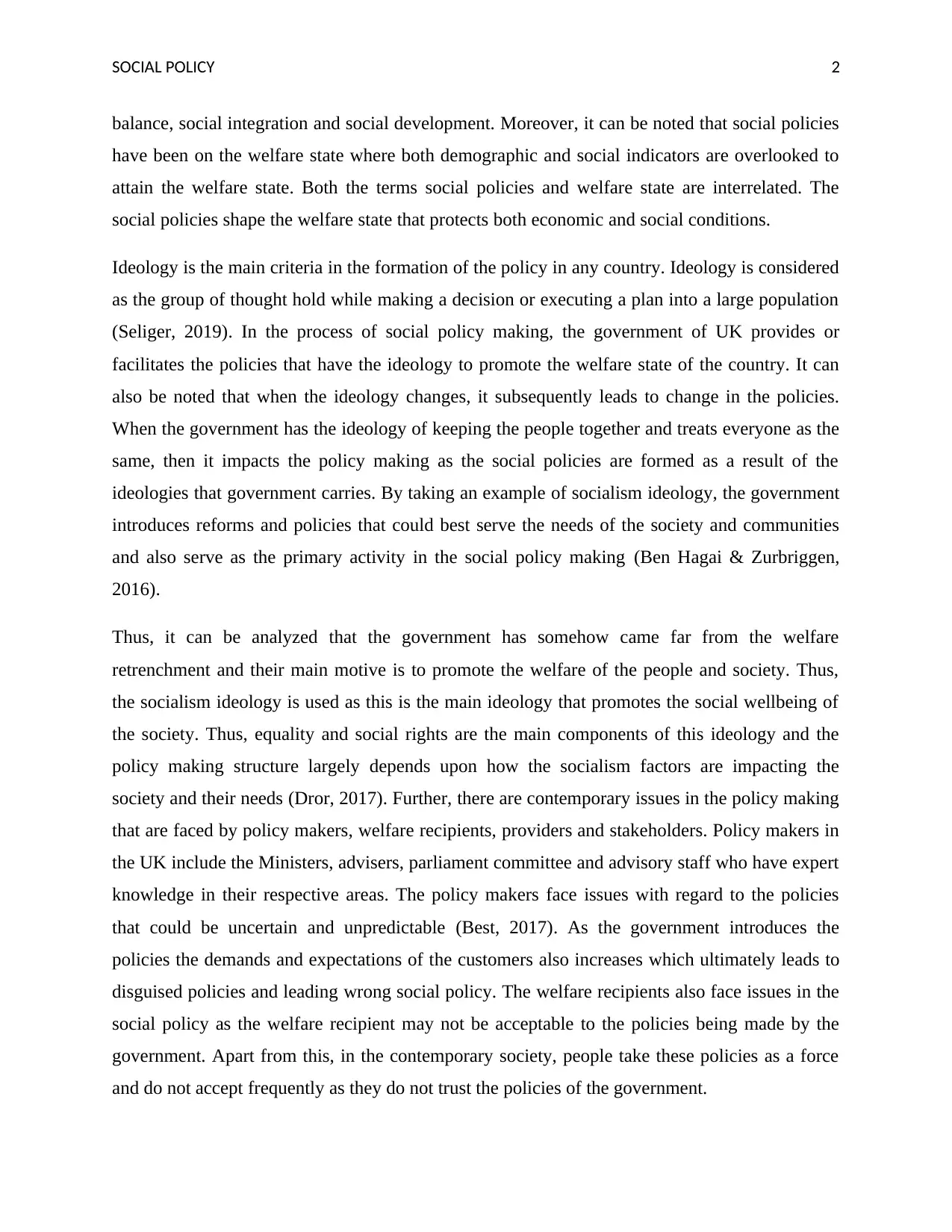
SOCIAL POLICY 2
balance, social integration and social development. Moreover, it can be noted that social policies
have been on the welfare state where both demographic and social indicators are overlooked to
attain the welfare state. Both the terms social policies and welfare state are interrelated. The
social policies shape the welfare state that protects both economic and social conditions.
Ideology is the main criteria in the formation of the policy in any country. Ideology is considered
as the group of thought hold while making a decision or executing a plan into a large population
(Seliger, 2019). In the process of social policy making, the government of UK provides or
facilitates the policies that have the ideology to promote the welfare state of the country. It can
also be noted that when the ideology changes, it subsequently leads to change in the policies.
When the government has the ideology of keeping the people together and treats everyone as the
same, then it impacts the policy making as the social policies are formed as a result of the
ideologies that government carries. By taking an example of socialism ideology, the government
introduces reforms and policies that could best serve the needs of the society and communities
and also serve as the primary activity in the social policy making (Ben Hagai & Zurbriggen,
2016).
Thus, it can be analyzed that the government has somehow came far from the welfare
retrenchment and their main motive is to promote the welfare of the people and society. Thus,
the socialism ideology is used as this is the main ideology that promotes the social wellbeing of
the society. Thus, equality and social rights are the main components of this ideology and the
policy making structure largely depends upon how the socialism factors are impacting the
society and their needs (Dror, 2017). Further, there are contemporary issues in the policy making
that are faced by policy makers, welfare recipients, providers and stakeholders. Policy makers in
the UK include the Ministers, advisers, parliament committee and advisory staff who have expert
knowledge in their respective areas. The policy makers face issues with regard to the policies
that could be uncertain and unpredictable (Best, 2017). As the government introduces the
policies the demands and expectations of the customers also increases which ultimately leads to
disguised policies and leading wrong social policy. The welfare recipients also face issues in the
social policy as the welfare recipient may not be acceptable to the policies being made by the
government. Apart from this, in the contemporary society, people take these policies as a force
and do not accept frequently as they do not trust the policies of the government.
balance, social integration and social development. Moreover, it can be noted that social policies
have been on the welfare state where both demographic and social indicators are overlooked to
attain the welfare state. Both the terms social policies and welfare state are interrelated. The
social policies shape the welfare state that protects both economic and social conditions.
Ideology is the main criteria in the formation of the policy in any country. Ideology is considered
as the group of thought hold while making a decision or executing a plan into a large population
(Seliger, 2019). In the process of social policy making, the government of UK provides or
facilitates the policies that have the ideology to promote the welfare state of the country. It can
also be noted that when the ideology changes, it subsequently leads to change in the policies.
When the government has the ideology of keeping the people together and treats everyone as the
same, then it impacts the policy making as the social policies are formed as a result of the
ideologies that government carries. By taking an example of socialism ideology, the government
introduces reforms and policies that could best serve the needs of the society and communities
and also serve as the primary activity in the social policy making (Ben Hagai & Zurbriggen,
2016).
Thus, it can be analyzed that the government has somehow came far from the welfare
retrenchment and their main motive is to promote the welfare of the people and society. Thus,
the socialism ideology is used as this is the main ideology that promotes the social wellbeing of
the society. Thus, equality and social rights are the main components of this ideology and the
policy making structure largely depends upon how the socialism factors are impacting the
society and their needs (Dror, 2017). Further, there are contemporary issues in the policy making
that are faced by policy makers, welfare recipients, providers and stakeholders. Policy makers in
the UK include the Ministers, advisers, parliament committee and advisory staff who have expert
knowledge in their respective areas. The policy makers face issues with regard to the policies
that could be uncertain and unpredictable (Best, 2017). As the government introduces the
policies the demands and expectations of the customers also increases which ultimately leads to
disguised policies and leading wrong social policy. The welfare recipients also face issues in the
social policy as the welfare recipient may not be acceptable to the policies being made by the
government. Apart from this, in the contemporary society, people take these policies as a force
and do not accept frequently as they do not trust the policies of the government.
⊘ This is a preview!⊘
Do you want full access?
Subscribe today to unlock all pages.

Trusted by 1+ million students worldwide
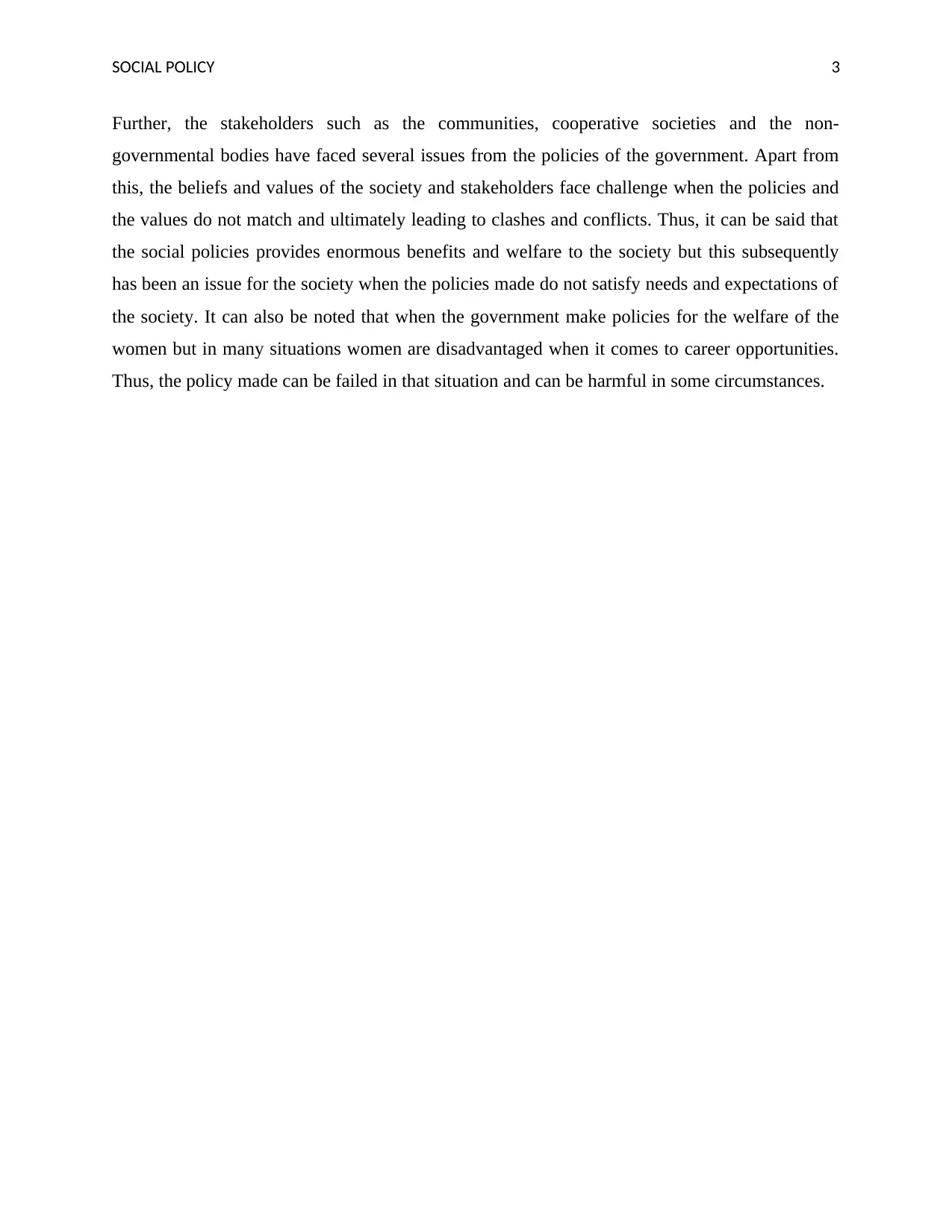
SOCIAL POLICY 3
Further, the stakeholders such as the communities, cooperative societies and the non-
governmental bodies have faced several issues from the policies of the government. Apart from
this, the beliefs and values of the society and stakeholders face challenge when the policies and
the values do not match and ultimately leading to clashes and conflicts. Thus, it can be said that
the social policies provides enormous benefits and welfare to the society but this subsequently
has been an issue for the society when the policies made do not satisfy needs and expectations of
the society. It can also be noted that when the government make policies for the welfare of the
women but in many situations women are disadvantaged when it comes to career opportunities.
Thus, the policy made can be failed in that situation and can be harmful in some circumstances.
Further, the stakeholders such as the communities, cooperative societies and the non-
governmental bodies have faced several issues from the policies of the government. Apart from
this, the beliefs and values of the society and stakeholders face challenge when the policies and
the values do not match and ultimately leading to clashes and conflicts. Thus, it can be said that
the social policies provides enormous benefits and welfare to the society but this subsequently
has been an issue for the society when the policies made do not satisfy needs and expectations of
the society. It can also be noted that when the government make policies for the welfare of the
women but in many situations women are disadvantaged when it comes to career opportunities.
Thus, the policy made can be failed in that situation and can be harmful in some circumstances.
Paraphrase This Document
Need a fresh take? Get an instant paraphrase of this document with our AI Paraphraser
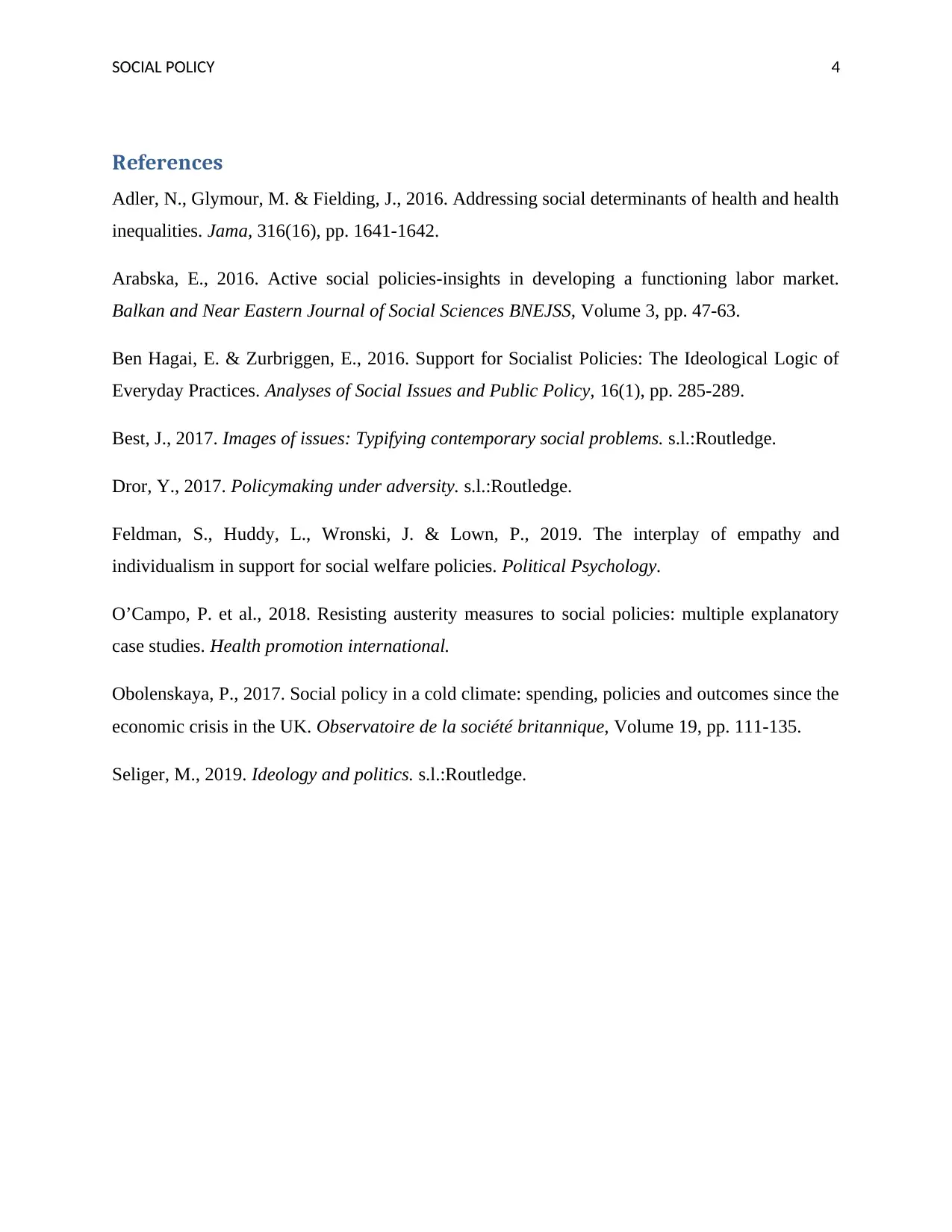
SOCIAL POLICY 4
References
Adler, N., Glymour, M. & Fielding, J., 2016. Addressing social determinants of health and health
inequalities. Jama, 316(16), pp. 1641-1642.
Arabska, E., 2016. Active social policies-insights in developing a functioning labor market.
Balkan and Near Eastern Journal of Social Sciences BNEJSS, Volume 3, pp. 47-63.
Ben Hagai, E. & Zurbriggen, E., 2016. Support for Socialist Policies: The Ideological Logic of
Everyday Practices. Analyses of Social Issues and Public Policy, 16(1), pp. 285-289.
Best, J., 2017. Images of issues: Typifying contemporary social problems. s.l.:Routledge.
Dror, Y., 2017. Policymaking under adversity. s.l.:Routledge.
Feldman, S., Huddy, L., Wronski, J. & Lown, P., 2019. The interplay of empathy and
individualism in support for social welfare policies. Political Psychology.
O’Campo, P. et al., 2018. Resisting austerity measures to social policies: multiple explanatory
case studies. Health promotion international.
Obolenskaya, P., 2017. Social policy in a cold climate: spending, policies and outcomes since the
economic crisis in the UK. Observatoire de la société britannique, Volume 19, pp. 111-135.
Seliger, M., 2019. Ideology and politics. s.l.:Routledge.
References
Adler, N., Glymour, M. & Fielding, J., 2016. Addressing social determinants of health and health
inequalities. Jama, 316(16), pp. 1641-1642.
Arabska, E., 2016. Active social policies-insights in developing a functioning labor market.
Balkan and Near Eastern Journal of Social Sciences BNEJSS, Volume 3, pp. 47-63.
Ben Hagai, E. & Zurbriggen, E., 2016. Support for Socialist Policies: The Ideological Logic of
Everyday Practices. Analyses of Social Issues and Public Policy, 16(1), pp. 285-289.
Best, J., 2017. Images of issues: Typifying contemporary social problems. s.l.:Routledge.
Dror, Y., 2017. Policymaking under adversity. s.l.:Routledge.
Feldman, S., Huddy, L., Wronski, J. & Lown, P., 2019. The interplay of empathy and
individualism in support for social welfare policies. Political Psychology.
O’Campo, P. et al., 2018. Resisting austerity measures to social policies: multiple explanatory
case studies. Health promotion international.
Obolenskaya, P., 2017. Social policy in a cold climate: spending, policies and outcomes since the
economic crisis in the UK. Observatoire de la société britannique, Volume 19, pp. 111-135.
Seliger, M., 2019. Ideology and politics. s.l.:Routledge.
1 out of 5
Related Documents
Your All-in-One AI-Powered Toolkit for Academic Success.
+13062052269
info@desklib.com
Available 24*7 on WhatsApp / Email
![[object Object]](/_next/static/media/star-bottom.7253800d.svg)
Unlock your academic potential
Copyright © 2020–2025 A2Z Services. All Rights Reserved. Developed and managed by ZUCOL.




